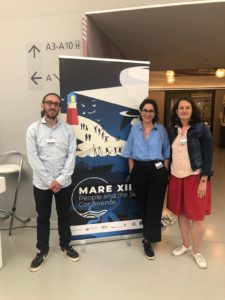This year’s 12th MARE Conference titled “Blue Fear: navigating ecological, social and existential anxieties during the Anthropocene” took place from 26 to 30 June at the University of Amsterdam.
Coastal populations, islanders, seafarers, fisher folk and researchers are concerned with sea level rise, climate change, pollution, multiple ocean uses, or the loss of biodiversity. In their everyday lives and work, they are most likely confronted with fear and anxiety. The conference used these feelings as starting points to discuss opportunities and challenges.

IDOS researchers Dr Jonas Hein, Dr Irit Ittner and Ramona Hägele presented their research in various formats. Jonas Hein elaborated on a joint paper (co-authored with Nils Hilder, CAU Kiel) on “Blue appropriation and resistance: sediments, marshland and the expanding port of Hamburg” in a panel on the political ecologies of ports. The panel contributions provided critical insights on the socio-ecological consequences of port expansion. In a panel on ocean privatisation chaired by Achim Schlüter (ZMT) and Marten Bavinck (University of Amsterdam), Jonas Hein presented a co-authored piece on “Bringing an ocean justice lens to ocean privatisation” (together with Anna Lena Bercht and Silja Klepp, both CAU Kiel) focusing on Indonesia, Norway, Italy and Germany. The panels provided diverse perspectives on the implications of ocean privatisation for coastal dwellers across the globe followed by a closing panel discussion involving among others Maria Hadjimichael (University of Cyprus), Liam Campling (Queen Mary University of London) and Jonas Hein.
Irit Ittner discussed “Natural gas extraction from the German North Sea? Fear as driver of opportunistic politics and organised resistance” joining the panel “Governing Offshore Energy”. The panel contributions also focused on the concerns about sabotage of undersea cables, the governance of future energy islands, as well as fears of coastal populations and indigenous people related to the landing of energy cables from offshore wind farms.
Ramona Hägele participated in a panel titled “Crossing boundaries and blending perspectives in research and partnerships”. Together with Laura McAdam Otto (Goethe University Frankfurt), she provided insights into their research on “Sensing Seagrass, Sensing Sediment”, which looks at human and non-human interactions and scientist’s reliance on their own senses, such as tasting, touching and smelling, during knowledge production processes.

Schreibe einen Kommentar